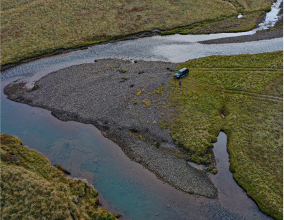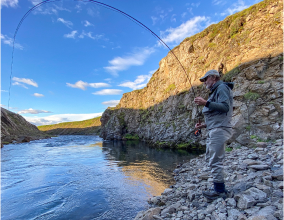In a letter to the editor in Bændabladid’s (The Farmers’ Newspaper) latest edition (19 March 2020), Gísli Ásgeirsson, Strengur’s CEO, talks about the Six Rivers Conservation Project, farm transactions, and limits to farm transactions proposed by the Prime Minister.
Strengur Angling Club was founded 60 years ago. Its activities have at times been included in the public debate about farm transactions, where opinions are divided. Strengur is also amongst those that will be affected by the newly proposed legislative changes that would make the sale of farms over certain size limits subject to the ministerial approval. The draft legislation is by many considered excessively burdensome, with the changes affecting a multitude of farms in Iceland, including most farms in the East and North East. And more may be affected that one would have thought initially.
Strengur’s interests have been well publicised in recent months. Our objectives are clear, to arrest the decline of the Atlantic salmon, now an endangered species, whilst benefitting the local community, sustainability and for the long term. This initiative is called the Six Rivers Salmon Conservation Project. It focuses on wild salmon stocks in the rivers of North East Iceland and has no plans to expand beyond that area.
As many know the project is instigated by a combination of Mr Ratcliffe’s land holdings in Iceland and by Strengur Angling’s profits generated from the sale of fishing licences on the six rivers in the North East. (For more information about the conservation project, please visit www.sixrivers.is.)
Strengur and many others have handed in opinions on the draft legislation in the government’s Consultation Portal. Some are highly critical of the proposed changes. Amongst them is the opinion handed in by the Farmers’ Association on March 11th. It points out that all restrictions on the sale of real estate, including farms, are going to limit the group of buyers and thereby devalue the property. “Lower value then means less room for a mortgage. In the Farmers’ Association’s opinion an independent examination is needed on the effects that limiting rules, such as those suggested, could have on the value and eligibility of assets, and on their consequences for the asset holders, including implications for their obligations,” the opinion states. The Association is also critical of how much authority is granted to the minister and warn that limits to the sale of property go against the property rights protected by Article 72 of the Icelandic Constitution.
This view is reflected in many other opinions that have been handed in. The views expressed in an article penned by Gunnar Þorgeirsson, newly elected chairman of the Farmers’ Association, in Bændablaðið on March 5th, this year, should also be noted, in which he states “it is no less important for the government to define a policy on what to do with state-owned farms, for they are many and unoccupied, and affect the settlement organisation in the rural areas.”
Whether the PM’s proposed Land Act changes help counter a trend where farming is being abandoned is debatable. The problems facing agriculture are well known. Bændablaðið’s frontpage story on October 24th 2019 was about the multitude of farms not in operation after having been inherited by descendants not interested in farming. This debate continues.
The goals of the proposed legislation – to ensure that land and resources are used for the benefit of the society and to be supportive of a diverse and competitive agricultural industry, nature conservation and the maintenance and development of residential areas, and of sustainable land use – fit well with the Six Rivers’ conservation and development work in the North East.
Continued traditional farming supports the goals of the conservation project and Strengur’s desire is to support coming generations in pursuing farming as an occupation. To that end, long-term lease agreements have been arranged. The transactions have sometimes lifted burdensome debts from farms, making farming them more feasible. In fact, farming has not been abandoned on any farm purchased in connection to the conservation project and in one case, farming was reintroduced where it was about to be discontinued.
In our opinion, the Six Rivers Conservation Project’s positive effects are not exclusive to the conservation work itself, but also greatly benefit the local community, including farmers. The end goal is for the project to be sustainable, with its entire income reinvested to continue development, thereby making it a long-term source of employment and activity in the area. Our objective is clear, to arrest the decline of the Atlantic Salmon in a sustainable manner, whilst benefitting the local community.
Gísli Ásgeirsson, CEO, Strengur Angling Club



